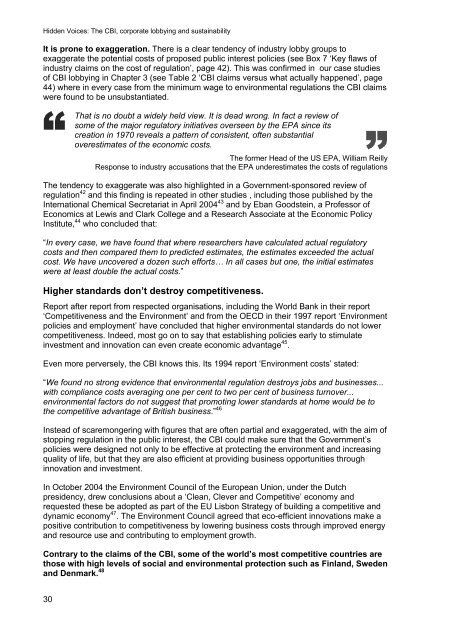hidden_voices
hidden_voices
hidden_voices
Create successful ePaper yourself
Turn your PDF publications into a flip-book with our unique Google optimized e-Paper software.
Hidden Voices: The CBI, corporate lobbying and sustainabilityIt is prone to exaggeration. There is a clear tendency of industry lobby groups toexaggerate the potential costs of proposed public interest policies (see Box 7 ‘Key flaws ofindustry claims on the cost of regulation’, page 42). This was confirmed in our case studiesof CBI lobbying in Chapter 3 (see Table 2 ‘CBI claims versus what actually happened’, page44) where in every case from the minimum wage to environmental regulations the CBI claimswere found to be unsubstantiated.That is no doubt a widely held view. It is dead wrong. In fact a review ofsome of the major regulatory initiatives overseen by the EPA since itscreation in 1970 reveals a pattern of consistent, often substantialoverestimates of the economic costs.The former Head of the US EPA, William ReillyResponse to industry accusations that the EPA underestimates the costs of regulationsThe tendency to exaggerate was also highlighted in a Government-sponsored review ofregulation 42 and this finding is repeated in other studies , including those published by theInternational Chemical Secretariat in April 2004 43 and by Eban Goodstein, a Professor ofEconomics at Lewis and Clark College and a Research Associate at the Economic PolicyInstitute, 44 who concluded that:“In every case, we have found that where researchers have calculated actual regulatorycosts and then compared them to predicted estimates, the estimates exceeded the actualcost. We have uncovered a dozen such efforts… In all cases but one, the initial estimateswere at least double the actual costs.”Higher standards don’t destroy competitiveness.Report after report from respected organisations, including the World Bank in their report‘Competitiveness and the Environment’ and from the OECD in their 1997 report ‘Environmentpolicies and employment’ have concluded that higher environmental standards do not lowercompetitiveness. Indeed, most go on to say that establishing policies early to stimulateinvestment and innovation can even create economic advantage 45 .Even more perversely, the CBI knows this. Its 1994 report ‘Environment costs’ stated:“We found no strong evidence that environmental regulation destroys jobs and businesses...with compliance costs averaging one per cent to two per cent of business turnover...environmental factors do not suggest that promoting lower standards at home would be tothe competitive advantage of British business.” 46Instead of scaremongering with figures that are often partial and exaggerated, with the aim ofstopping regulation in the public interest, the CBI could make sure that the Government’spolicies were designed not only to be effective at protecting the environment and increasingquality of life, but that they are also efficient at providing business opportunities throughinnovation and investment.In October 2004 the Environment Council of the European Union, under the Dutchpresidency, drew conclusions about a ‘Clean, Clever and Competitive’ economy andrequested these be adopted as part of the EU Lisbon Strategy of building a competitive anddynamic economy 47 . The Environment Council agreed that eco-efficient innovations make apositive contribution to competitiveness by lowering business costs through improved energyand resource use and contributing to employment growth.Contrary to the claims of the CBI, some of the world’s most competitive countries arethose with high levels of social and environmental protection such as Finland, Swedenand Denmark. 4830


